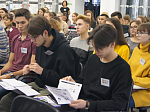The International School for Young Architects "ART Polis"
 Location and headliner: Kazan State University of Architecture and Engineering (KSUAE).
Location and headliner: Kazan State University of Architecture and Engineering (KSUAE).
The school was delivered with support of the Ministry of Culture of the Republic of Tatarstan.
Duration: 2 weeks
Number of participants: 70
Participants: KSUAE students of Architectural sciences and dual degree programme KSUAE-UEL, architecture students from 13 cities of Russia and countries of former Soviet Union. As well as the senior school pupils of Kazan schools (including students of Architecture and Design School of KSUAE “DASHKA”).
Object under analysis: Kazan theatre for young audience.
Objective: to create interactive transformable environment for conducting educational practices (performance trainings for children and young people, lectures, seminars, master classes, film screenings), festivals, exhibitions, performance art, as well as theatrical performances in various formats (including open-air) on the territory of Kazan theatre for young audience (including the disability service organization).
Sections: theoretical block, master-classes and practical historical site restoration project.
Speakers and report topics:
- Professor Renée Tobe (East London university, Great Britain): British urban planning legislation and aspects of design in the historical environment
- Professor Peter Lakin (East London University, Great Britain): digital technologies in architecture – BIM and SMART technologies
- Professor Vicente Guallart (Modern architecture institute of Catalonia, Barcelona, Spain and Higher School of Economics, Moscow, Russia): Prototyping future cities using modern technologies and internet
- Professor Stefano Bertocci and professor Michelangelo Pivetta (both of them work at the University of Florence, Italy): the role of modern digital technologies in the preservation of cultural heritage
- UNESCO expert, professor Alkiviadis Prepis (Democritus University of Thrace, Greece): Specific approaches to the treatment of distinct types of Historic Properties (industrial buildings)
- Architect-urbanist Alkistis Prepi (Greece): sustainable development of the cities
- Professor Peter Orekhovskiy (Russian Academy of Sciences, Russia): economical aspects of the city development
- Interactive space expert Andrey Matveev (Russia): features and technological design solutions of interactive environment.
Master-classes:
- Master-class on paper plastic (Ryabov N.F., KSUAE): Distinct paper-plastic techniques that exploit the potential of a blank sheet of paper, which contains an infinite array of ideas, to solve a specific project tasks.
- Master-class «Architectural toy of the future» (Yegor Orlov, researcher in the field of the architecture theory): experimental design using the example of an architectural toy as elementary particle acting in urban space.
- Master-class on formation of different types of presentation of the architectural projects (Anna Akatyeva, architect): theoretical and practical aspects of the formation of different types of architectural project presentations in verbal and non-verbal form.
The participants were divided into 7 teams of 10 members each. Each of these teams was headed by a tutor, who was a professor of the Institute of architecture and design of KSUAE.
Teams explored and implemented one of the following aspects: interactivity, mobility, integrity, complexity, continuity, ephemerality and activity within the framework of common functional zoning. Continuous communication between teams helped to preserve the integrity of the common idea.
Phases of the project:
- getting familiar with the design area, tour around all theatre areas and description of their theatrical features, conversation with director of the Kazan theatre for young audience.
- team work on the project: information collection, brainstorming, project concept developing and preparation for presentation.
Result: Conceptual proposals embodied in info-graphics using analogue, main drawing sketches (layouts which indicate functional areas, travel routes for visitors and staff and other information, section drawings, facades, extensions and other drawings which explain the technological solutions) overhead images (in collage form), showing what the new space will look like from the viewpoint of visitors. A list of technologies and technological solutions, which are to be used for the implementation of this project, has been drawn up.
The results of the project were presented to the Board consisted of the local authorities and experts as well as of "ART Polis" School experts and KSUAE professors.
The implementation of this project is very important for the city of Kazan, as the development of culture gives impetus to the development of society and the economy as a whole, creates favourable atmosphere of the city. The territory of the Kazan Theatre of Young Spectators has great potential to become a center of culture, a place of creative development of the inhabitants of Kazan of all ages.
All participants got KSUAE certificates for vocational training as well as international certificates.
